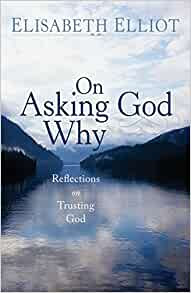by Elizabeth Elliot
176 pages / 2006 (originally published in 1989)
Elizabeth Elliot knew why we want to ask God why, from experience, but what makes this collection of essays so valuable is that she also knew why we should ask God why. Elliot is also the author of Through Gates of Splendour (reviewed in this blog last month), a book which reveals how, already in early adulthood, she began to ask God why He brought her into situations that deeply tested her faith in Him.
Christian authors are often described as inspiring, but a better word for Elliot's work would be bracing, like the splash of cold water on your face that wakes you up in the morning. She never promises false hope or easy solutions. Instead, knowing from her own hard life how much our suffering can shake us, or even shake our faith in God, she points us to Christ and the way of suffering He trod to save us. Confronting numerous issues, such as divorce, abortion, women's place in the home, and courtship, Elliot calls us to be willing to suffer ourselves as part of our path to spiritual maturity.
Jordan Peterson tells us that if we want to solve the problems of the world, we should start by making our bed. Similarly, Elliot tells us that we need to grow up, but unlike Peterson, she knows that growing up means trusting more in our Father in heaven than ourselves.
Some minor cautions (along with my assessment of why they are not as serious as they might seem):
- Some of the references in the book are dated (and therefore, historically interesting).
- One of the essays attacking abortion refers to a fetus "becoming a person," but it is clear later in the essay that she sees the unborn child as worthy of protection.
- She refers to animals having "souls" (but vertebrate animals do share nephesh (the Hebrew word for life in the Bible that does not apply to "the creeping things) with human beings, and creation will also be redeeemed, along with humans).
- There is one quotation from Karl Barth, who is called a "great theologian" (but the quotation itself is probably the truest thing he ever said).
If you want to see how to ask God why for all the right reasons, you can get Elliot's book here, and here in Canada.


No comments:
Post a Comment